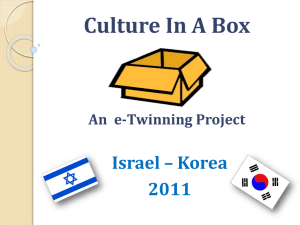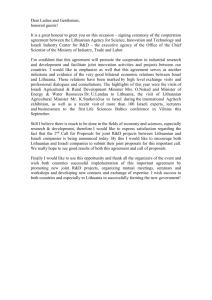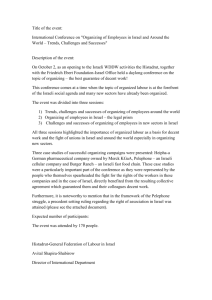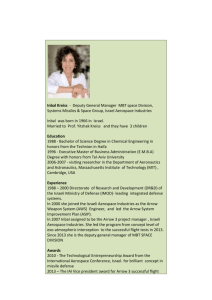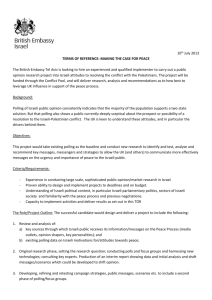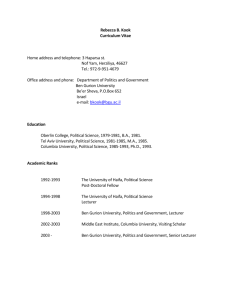Professor Tim McCormack thanked Nina Bassat and David Marlow
advertisement
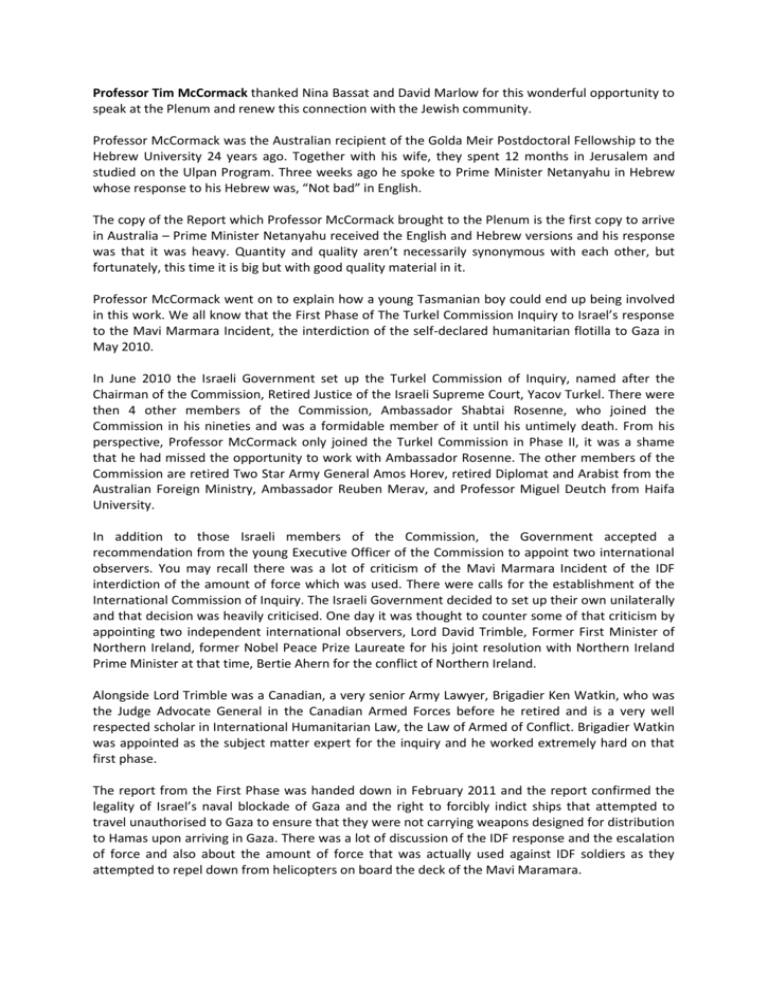
Professor Tim McCormack thanked Nina Bassat and David Marlow for this wonderful opportunity to speak at the Plenum and renew this connection with the Jewish community. Professor McCormack was the Australian recipient of the Golda Meir Postdoctoral Fellowship to the Hebrew University 24 years ago. Together with his wife, they spent 12 months in Jerusalem and studied on the Ulpan Program. Three weeks ago he spoke to Prime Minister Netanyahu in Hebrew whose response to his Hebrew was, “Not bad” in English. The copy of the Report which Professor McCormack brought to the Plenum is the first copy to arrive in Australia – Prime Minister Netanyahu received the English and Hebrew versions and his response was that it was heavy. Quantity and quality aren’t necessarily synonymous with each other, but fortunately, this time it is big but with good quality material in it. Professor McCormack went on to explain how a young Tasmanian boy could end up being involved in this work. We all know that the First Phase of The Turkel Commission Inquiry to Israel’s response to the Mavi Marmara Incident, the interdiction of the self-declared humanitarian flotilla to Gaza in May 2010. In June 2010 the Israeli Government set up the Turkel Commission of Inquiry, named after the Chairman of the Commission, Retired Justice of the Israeli Supreme Court, Yacov Turkel. There were then 4 other members of the Commission, Ambassador Shabtai Rosenne, who joined the Commission in his nineties and was a formidable member of it until his untimely death. From his perspective, Professor McCormack only joined the Turkel Commission in Phase II, it was a shame that he had missed the opportunity to work with Ambassador Rosenne. The other members of the Commission are retired Two Star Army General Amos Horev, retired Diplomat and Arabist from the Australian Foreign Ministry, Ambassador Reuben Merav, and Professor Miguel Deutch from Haifa University. In addition to those Israeli members of the Commission, the Government accepted a recommendation from the young Executive Officer of the Commission to appoint two international observers. You may recall there was a lot of criticism of the Mavi Marmara Incident of the IDF interdiction of the amount of force which was used. There were calls for the establishment of the International Commission of Inquiry. The Israeli Government decided to set up their own unilaterally and that decision was heavily criticised. One day it was thought to counter some of that criticism by appointing two independent international observers, Lord David Trimble, Former First Minister of Northern Ireland, former Nobel Peace Prize Laureate for his joint resolution with Northern Ireland Prime Minister at that time, Bertie Ahern for the conflict of Northern Ireland. Alongside Lord Trimble was a Canadian, a very senior Army Lawyer, Brigadier Ken Watkin, who was the Judge Advocate General in the Canadian Armed Forces before he retired and is a very well respected scholar in International Humanitarian Law, the Law of Armed of Conflict. Brigadier Watkin was appointed as the subject matter expert for the inquiry and he worked extremely hard on that first phase. The report from the First Phase was handed down in February 2011 and the report confirmed the legality of Israel’s naval blockade of Gaza and the right to forcibly indict ships that attempted to travel unauthorised to Gaza to ensure that they were not carrying weapons designed for distribution to Hamas upon arriving in Gaza. There was a lot of discussion of the IDF response and the escalation of force and also about the amount of force that was actually used against IDF soldiers as they attempted to repel down from helicopters on board the deck of the Mavi Maramara. That report was taken seriously in international circles and one of the international investigations that were conducted, The Palmer Commission Of Inquiry, was laudatory in its praise of the first Turkel Commission Report. It didn’t agree with all the findings of the Commission Report but it certainly affirmed the legality of the naval blockade, which was some comfort to those members of the commission who drafted and tabled that first report. In March 2011 after the first report had been handed down, there was a decision taken to extend the mandate of the Turkel Commission beyond the original incident of this humanitarian so called flotilla. To broaden out the inquiry, to look not just at a single incident, but to look at how Israel investigates alleged violations of the Law of Armed Conflict, or International Humanitarian Law. Not in relation to a specific incident, or even a group of specific incidents, but generally speaking, are Israel’s mechanisms for examining and investigating alleged violations of this body of law consistent with international legal obligations or not? Let’s have an open independent inquiry into that question and see what we come up with. The Government agreed and extended the mandate of The Turkel Commission and so through April 2011 there were a number of extensive hearings conducted involving interviews with and testimony from all the relevant Israeli Government agencies, the Israeli Defence Force from its operators as well as from its lawyers from the Shin Bet, the Secret Intelligence Service, from the Police, from the Attorney-General and then also from a number of Israeli NGO’s. In May 2011 after those hearings had been concluded, Brigadier Watkin had to return back to North America. He agreed to take up a position from early June 2011 at the US Naval War College and couldn’t delay his departure from Jerusalem any longer, so he left. The Commission needed to find a law of armed conflict to replace him, and that’s where the invitation came to him, which he is privileged to say. The young Executive Officer of the Commission rang him and they had a number of conversations about whether he would accept this position or not. He had some questions to ask about the independence of the Commission and whether they would be able to do their work with Government influence, and he was assured that they were, and the first phase had been reflective of that. He had extensive conversations with Brigadier Watkin who confirmed all of that, so he said that he was happy to talk some more. He was then asked where he would be in the week commencing May 11 2011. He would be in Sydney as he happened to be providing some legal advice to the defence for the court marshall proceedings against two Australian Defence Force Officers who were charged with some criminal offences in relation to an incident in Afghanistan. So this guy flew to Sydney and he had his interview for the job. It wasn’t sort of couched that way, it wasn’t really constructed that way but that’s in fact what it was. They had a fairly lengthy chat and tried to find a kosher restaurant, it wasn’t easy to do, but they managed to find one in Bondi Junction and had a nice meal together. It was a great experience for him as he has never had anyone fly across the other side of the world to check him out before. In June 2011, he flew to Jerusalem on the first of five trips over the next nineteen month period, and met with Commission members and became an official observer with Lord Trimble, replacing Brigadier Watkin for the rest of phase II. He thought it was a bit of a disadvantage to him personally, to miss out on hearing the testimony of the various people who spoke to the Commission, but he had full access to the transcripts of all their testimony, and had the opportunity to bone up on what had been said. He commented on the structure of the report and the approach that was taken and also on some recommendations and what he considers to be the significance of this report. The report starts off with a very detailed study, in fact his view is that there isn’t anything equivalent to it in the international legal literature. A very detailed study of a question, of what international law obliges states to do by way of investigation of alleged violations of the Law of War and Armed Conflict, using these terms interchangeably. Professor McCormack stated that it was interesting as he had never done an extensive study himself, he spent the last twenty four years of his academic career focused on this body of law, which has always been on the rules and understanding of what they are, and also in enforcement in terms of relation to violations, the process of the criminal trial proceedings, whether they are fair or not, open or transparent, and whether they reach a proper conclusion in terms of the facts and the law as applied to those facts or the alleged facts. What is really fundamental in the process of course is the investigation in the first place, that leads to a decision being made about whether to lay charges or not. This is an aspect that he had never really considered himself. What this report does is really explore in the greatest detail that anybody has ever done before, a comprehensive study as to what the international law would have to say about that. This is not an academic or theoretical question because interestingly in the Rome statute for the International Criminal Court, there is a very important provision about whether the court can exercise jurisdiction in circumstances where a relevant state has demonstrated a lack of willingness to take it’s national responsibility seriously to investigate and prosecute an alleged war crime, or an alleged crime against humanity, or alleged crime of genocide, the core crimes in the jurisdiction of the International Criminal Court. That provision specifies and provides some examples of what constitutes a lack of willingness on the part of a state. One of them is that the relevant state has not undertaken an impendent and partial investigation. There is this concept in International Criminal Law in the statute of the International Criminal Court that states have to undertake a bonafide independent and impartial investigation, and if they don’t, they run the risk of the International Criminal Court exercising its jurisdiction. A lot of states in which Israel is amongst them have a very significant interest in assuring that its processes for investigation meet that standard of the independent and impartial. A lot of the first part of the report focuses on what the International Law says constitutes an independent and impartial investigation. Moving on from the identification of the current state of the law, to what other states actually do. One of the very important features of the Turkel Commission Report for Phase II, involves a comparative study of six countries, less UK, Canada and Australia as common law countries, Germany and the Netherlands as continental European countries with a civil law system. In each of the cases there experts from each of the six national jurisdictions undertake a comprehensive study about their military justice system and what processes they implement to investigate alleged war crimes or violation of this body of law. Professor McCormack wrote the report for the Australian Military justice System, which was a really great experience to get down into the detail of our Military Justice System, which he was familiar with some things but certainly not as much as he knows now. Having undertaken these six studies they tried to do a synthesis assessing what are the commonalities and what are the points of difference, and what we can learn about the approach of these jurisdictions. Then having done a comparative study on international law, some selected case studies from international experiences, we look at the Israeli system, what are the mechanisms and the processes that currently exist, and how does that system measure up to what we understand now, as a consequence their study here to be the International Liquor Standard. Twenty eight recommendations are made as part as our response and our assessment and analysis of the Israeli approach to examining and investigating alleged violations of the law. Lord Trimble had the authority of personal experience to Northern Island to assist on certain standards being implemented, the least that is recommended to the Israeli Government, that certain standards have to be met. The Commission heard testimony to the effect that over a specified period of time, there were as many six hundred allegations of mistreatment or worse, torture, and not one of these allegations led to disciplinary actions. The Commissioner was quite shocked by that statistic and Lord Trimble insisted that there has to be something done about that. There were two recommendations in relation to the Commission’s consideration of these statistics. One of them is whether Shin Bet should be investigating complaints against it, the way it has always been, and their recommendation is that this change, instead that the Israeli Police investigative service takes responsibility for investigating allegations of mistreatment. There has to be some independence from the chain of command to valiantly be able to put your hand on your heart and that this investigation was independent and impartial. The second recommendation in relation to the Shin Bet is that all interrogations should be video recorded. Lord Trimble’s view was that in Northern Ireland it was after the imposition by law of mandatory video recording of all British interrogations of Northern Irish suspects that the incidence of alleged mistreatments in the contents of the interrogations plummeted. Lord Trimble went a little out on a limb and absolutely insisted on it. Those two recommendations will probably be the most controversial in terms of internal Israeli Government consideration. There are other structural recommendations that relate to the Military Justice System in Israel. The Military Advocate General has in the past worn two hats, which can add tension in terms of responsibilities. Prior to our recommendations, the Military Advocate General was primarily responsible for all legal advice in relation to Israel Defence Force Military Operations, but was also the person exclusively responsible for determining whether or not charges should be laid, whether or not an Israeli Defence Force member against whom their war crime allegations should be tried or should be disciplined in some way. One of the academics presented testimony to the Commission that this is problematic, it creates some tension in regards to the Military Advocate General’s responsibilities. So the Commission’s recommendations is that in relation to legal advice he not be the sole source of it, that in fact there would be specialist international humanitarian law of armed conflict advice from within the Attorney General’s office, a Ministry of Justice and also that the Military Advocate General not exercise exclusive responsibility in terms of deciding whom against charges might be laid but that the military prosecutor have greater authority and autonomy and that the Military Advocate General also be more answerable to the Attorney General than is currently the case. The first thing significant in relation to the report, was that he doesn’t know any other country that setup an independent commission of inquiry to review its national investigative mechanisms. He is actually proud that Israel did that in this case, and that the process was truly independent. At the time that Professor McCormack was first asked to join the Commission as its National Observer, he was also Special Advisor on Humanitarian Law to the Prosecutor International Criminal Court in the Hague, an appointment he took up in March 2010 which he still holds today. When Professor McCormack was first asked in 2011 to join the Commission, he said that he needed to speak to the Prosecutor. You might recall that in 2009 the Palestinian authority had lodged a declaration with the Registrar of International Criminal Court claiming that they were consenting to the exercise of the court’s jurisdiction, and there were lengthy, several years in fact till late last year, a process of trying to determine whether that was a valid declaration or not. Personally he did not think he was afflicted if he took on the position with The Turkel Commission but wanted to make sure that the Prosecutor of International Criminal Court was comfortable with him doing it, so they had a lengthy chat on the phone from Melbourne to the Hague, whose response was very encouraging and stated that it was entirely consistent with their statute that they support any country in the world whether they are a state party to the Rome Statute or not, Israel isn’t, that they support them in any attempt to review their internal or national processes for investigating alleged war crimes. He was advised that if any Palestinian authority had problems with this then it would be handled by the Prosecutor of International Criminal Court. This was extremely encouraging to him. Professor McCormack told the Israeli Prime Minister that he congratulated him on the initiative to setup an independent Commission of Inquiry. The second thing significant in relation to the report, is that the international analysis breaks new ground. Interestingly he had an unsolicited email from a colleague from The Israeli Ministry of Justice, who sent congratulations on The Turkel Commission Report, “a wonderful piece of work,” that many of his colleagues believe that this is one of Israel’s greatest contributions to the development of international law. Professor McCormack was very greatful to him for sharing this observation with him. No punches were pulled with the recommendations that were made, some of them hard hitting. The IDF announced publicly after the report was tabled that they could live with it. He doesn’t think that the Military Advocate General is really excited about it, but interestingly from his perspective, there were media that afternoon praising the report and Government for setting up a Commission that would produce a report like that. The Haaretz Newspaper that came out after the Commission Report was tabled, was laudatory and urged the Government to take these recommendations seriously and implement them, as they are in the best interest of the state of Israel. His opinion is that to get so many remarks like this is not a bad effort. Implementation of course is the critical thing, as all the Commission can do is make the recommendations but have no authority to implement them. They are dependent on Prime Minister Netanyahu and the Israeli Government to implement these recommendations. It will be fascinating to see if this happens or not, but was assured that a taskforce will be setup with the responsibility to review all the recommendations and that they will be taken very seriously indeed. Professor McCormack finished off with some acknowledgements of thanks to the Executive Officer of the Commission, a young Harvard graduate who was with the Israeli Foreign Ministry and the Prime Minister’s office, who ran this Commission and searched, found and formed a group of international advisors. He was the one who identified the most appropriate people to be appointed as international observers and did a tremendous job. Professor McCormack would like to acknowledge that and personally what a joy it was to work with him. There is one other person from Melbourne whom Professor McCormack would like to acknowledge as well, Michelle Lesh, who through Australian friends was awarded the newest recipient of the Golda Meir Postdoctoral Fellowship at the Hebrew University, in late 2012. She was appointed on Professor McCormack’s recommendation, as he had a very bright Masters graduate from NYU, Maron, an Israeli who had been working with him and had to go back to the US from Israel, to start a Doctoral study in NYU, and thought that they were irreplaceable. Michelle Lesh was Professor Tim McCormack’s PhD students who graduated and went off to Jerusalem to take up where Maron had left off. She has done a fantastic job, and that he is sure of the fact that the quality of their international legal analysis and the contribution that the Ministry of Justice says could be Israel’s greatest contribution of International law, is largely due to her superb research and writing skills. As a dear friend, there is a lovely symmetry for him that in twenty five years of Friends of the Hebrew University, awarding the Golda Meir Postdoctoral Fellowship, the first and most recent recipients of it would have an opportunity to work on a study like this. He is really glad that this is the way it has worked out. Professor McCormack thanked everyone for listening.
